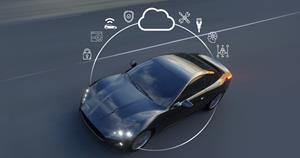- Collaboration combines NXP’s automotive quality and functional safety with TSMC’s industry-leading 5nm technology to further drive the transformation of automobiles into powerful computing systems for the road
- NXP’s breakthrough SoC platform, devoted to automotive, aims to simplify and accelerate rapid innovation in vehicle architectures with a focus on safety, security and data integrity
- TSMC’s 5nm process provides world-class power, performance and gate density for a compelling technology offering
EINDHOVEN, The Netherlands and HSINCHU, Taiwan, June 12, 2020 (GLOBE NEWSWIRE) -- NXP Semiconductors N.V. (NASDAQ: NXPI) and TSMC (TWSE: 2330, NYSE: TSM) today announced a collaboration agreement to adopt TSMC’s 5-nanometer (5nm) technology for NXP’s next generation, high-performance automotive platform. This collaboration combines NXP’s automotive design expertise with TSMC’s industry-leading 5nm technology to further drive the transformation of automobiles into powerful computing systems for the road.
Building upon multiple successful 16nm designs, TSMC and NXP are expanding their collaboration to create a System-on-Chip (SoC) platform in 5nm to deliver the next generation of automotive processors. Using TSMC’s 5nm process, NXP’s offerings will address a wide variety of functions and workloads, such as connected cockpits, high-performance domain controllers, autonomous driving, advanced networking, hybrid propulsion control and integrated chassis management.
TSMC’s 5nm technology is currently the world’s most advanced process in volume production. NXP will adopt N5P, an enhanced version of TSMC’s 5nm technology, which provides about 20 percent faster speed or about 40 percent power reduction compared to the preceding 7nm generation, and is supported by the industry’s most comprehensive design ecosystem.
NXP is a leading global automotive supplier with a rich history in vehicle control, vehicle safety, vehicle infotainment and digital clusters. NXP’s developments on 5nm, initially based on its established S32 architecture, will lead to new architectures offering scalability and a common software environment, further simplifying and enabling the significant increase in software performance required in the future car. Leveraging the computing power and power efficiency of the 5nm technology, NXP will meet the high levels of integration, power management and compute power required for advanced vehicle architectures as well as their stringent safety and security needs with its renowned IP.
“Modern vehicle architectures need to harmonize software infrastructure across domains to leverage investments, scale deployments and share resources,” said Henri Ardevol, Executive Vice President and GM, Automotive Processing at NXP. “NXP aims to deliver the premier automotive processing platform based on TSMC’s 5nm process, with a consistent architecture across domains and with differentiation in performance, power, and world-class safety and security. Car OEMs need a simpler coordination of advanced functions across control-units, the flexibility to locate and port applications seamlessly, and the certainty of execution in a critical safety and security context. NXP is powerfully positioned to deliver those automotive-specific benefits, now with leading-edge metrics through the TSMC partnership.”
“TSMC’s latest collaboration with NXP truly demonstrates how automotive semiconductors have evolved from simple microcontrollers to sophisticated processors on par with chips used in the most demanding high-performance computing systems,” said Dr. Kevin Zhang, Vice President of Business Development at TSMC. “TSMC has enjoyed a long history of strong partnership with NXP, and we are excited to take the automotive platform another step forward into the most advanced technology available in the market and unleash the power of NXP’s innovative products for intelligent automotive applications and more.”
NXP and TSMC expect the delivery of first samples of 5nm devices to NXP’s key customers in 2021.
About NXP Semiconductors
NXP Semiconductors N.V. enables secure connections for a smarter world, advancing solutions that make lives easier, better, and safer. As the world leader in secure connectivity solutions for embedded applications, NXP is driving innovation in the automotive, industrial & IoT, mobile, and communication infrastructure markets. Built on more than 60 years of combined experience and expertise, the company has approximately 29,000 employees in more than 30 countries and posted revenue of $8.88 billion in 2019. Find out more at
www.nxp.com.
NXP and the NXP logo are trademarks of NXP B.V. All other products or service names are the property of their respective owners. All rights reserved. © 2020 NXP B.V.
About TSMC
TSMC pioneered the pure-play foundry business model when it was founded in 1987, and has been the world’s largest dedicated semiconductor foundry ever since. The Company supports a thriving ecosystem of global customers and partners with the industry’s leading process technologies and portfolio of design enablement solutions to unleash innovation for the global semiconductor industry. With global operations spanning Asia, Europe, and North America, TSMC serves as a committed corporate citizen around the world.
TSMC deployed 272 distinct process technologies, and manufactured 10,761 products for 499 customers in 2019 by providing broadest range of advanced, specialty and advanced packaging technology services. TSMC is the first foundry to provide 5-nanometer production capabilities, the most advanced semiconductor process technology available in the world. The Company is headquartered in Hsinchu, Taiwan.
| TSMC Spokesperson:
Wendell Huang Vice President and CFO Tel: +886-3-505-5901 | TSMC Media Contact:
Nina Kao Head of Public Relations Tel: 886-3-5636688 ext.7125036 Mobile: +886-988-239-163 E-Mail: nina_kao@tsmc.com | NXP Worldwide Media Contact
Jacey Zuniga Tel: +1-512-895-7398 E-Mail: jacey.zuniga@nxp.com | NXP Europe Media Contact
Jason Deal Tel: +44-771-522-8414 E-Mail: jason.deal@nxp.com |
NXP- Auto
NXP - Corporate
A photo accompanying this announcement is available at https://www.globenewswire.com/NewsRoom/AttachmentNg/05dcbc9d-fb49-460d-b4a6-c28da0105380

